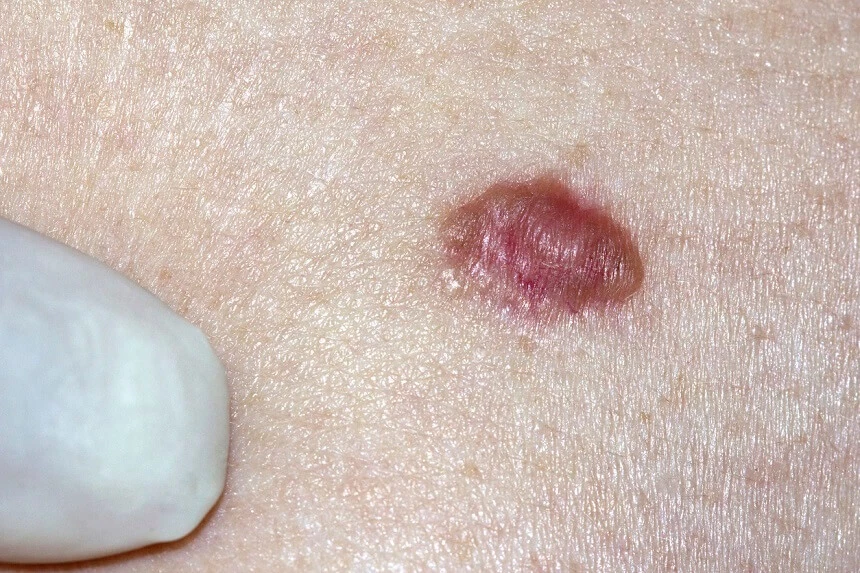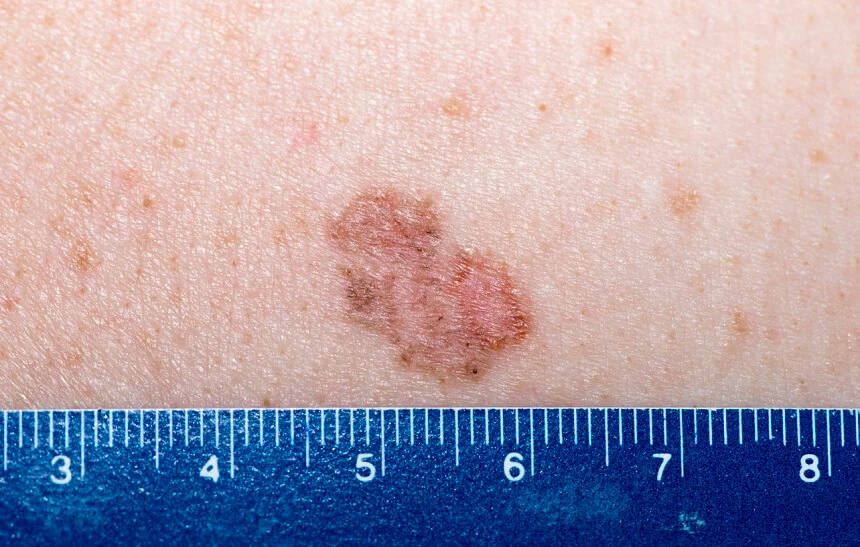
Basalcell carcinoma (BCC) accounts for approximately 80% of all skin cancers. Together with squamous cell carcinoma (15-20%), it is responsible for most cases of the so-called nonpigmented skin cancers. In 2019, 14,266 cases among Poles were recorded in this group.
It originates from the non-keratinized cells of the basal layer of the epidermis and is found mainly in Caucasians. The incidence of this type of cancer increases with age and most often affects people over 60 years of age.
Symptoms of basal cell carcinoma
In most cases (>80%), this type of cancer occurs on the scalp, primarily on the face and neck, but can also occur in other places.
Nodular form
There are several types of this tumor, but the nodular form is the most typical. It may resemble a nodular form of melanoma. This type is characterized by the presence of a pearl-colored nodule surrounded by a shaft of small pearl-like nodules.
Surface form
The second common variation is the superficial form. In its course, the lesions are flat or flat raised, scaly and reddened.
Basal cell carcinoma of the skin - causes
The most important factors affecting the occurrence of basal cell carcinoma are:
- genetic predispositions
- UV
- exposure to solar radiation - especially in childhood and leading to burns
- old age
- male gender
- light complexion
- immunosuppressive treatment
Diagnosis of basal cell carcinoma
The doctor first looks at the changes through a dermatoscope, but the final diagnosis is made only after obtaining a microscopic evaluation of the specimen. For this purpose, the specialist anesthetizes the appropriate area of the skin, excises the lesion and submits the section for histopathological examination, during which cancer cells are looked for.
Diagnosis at an early stage is extremely important because the earlier the cancer is diagnosed, the better the chances of a cure.
The diagnosis of basal cell carcinoma consists in excision of the lesion and submitting it for histopathological examination.

Treatment of basal cell carcinoma of the skin
Treatment of this skin cancer consists in removing the skin lesion with an appropriate margin (so-called excisional biopsy).
For superficial skin cancer, topical treatment is applied by applying a cream containing imiquimod to the affected skin. Precise details on the use of the preparation are provided by the doctor.
Other BBC treatments for patients who are unwilling or unsuitable for surgery include radiotherapy, cryosurgery1 and photodynamic therapy.
If the tumor grows slowly and does not infiltrate deep, effective treatment is possible. It is more difficult to treat a more aggressive lesion, infiltrating deep into the body, with a tendency to recur.
In the case of distant metastases, the treatment is individualized and includes surgery, radiotherapy, chemotherapy or the newly registered vismodegib therapy - a molecularly determined drug.
After treatment, regular check-ups are recommended as recommended by your doctor.
Check out Medicover's cancer treatment offer >>
Basal cell skin cancer - prognosis and complications
Basal cell carcinoma grows slowly and rarely metastasizes. It is characterized by local malignancy and in most cases a good prognosis - almost all patients survive 10 years after diagnosis.
Depending on the treatment method used, local recurrences are found in up to 50% of patients, but the results of their treatment are also very good.
Metastases in basal cell carcinoma are very rare, but they are associated with a worse prognosis.
Prevention of basal cell carcinoma
Preventing advanced forms of basal cell carcinoma involves:
- assessing each patient's risk characteristics and adjusting prophylactic procedures,
- providing people from risk groups with more detailed care,
- avoiding excessive exposure to the sun, especially short episodes of intense sunlight causing skin burns,
- taking care of adequate protection against the sun, using creams with a UV filter.
Check out Medicover's cancer prevention offer >>
Remember!
- Monitor your skin every month, and if something concerns you, contact a dermatologist.
- Have your skin checked by your doctor once a year.
- Take care of adequate sun protection - use creams with a high UV filter, avoid exposing yourself to the sun between 10.00 and 16.00, wear sunglasses with a UV filter.
Medicover offer
|
The presented medical information should not be treated as guidelines for medical conduct in relation to each patient. The medical procedure, including the scope and frequency of diagnostic tests and/or therapeutic procedures, is decided by the doctor individually, in accordance with medical indications, which he determines after getting acquainted with the patient's condition. The doctor makes the decision in consultation with the patient. If the patient wants to perform tests not covered by medical indications, the patient has the option of paying for them. |
Prezentowanych informacji o charakterze medycznym nie należy traktować jako wytycznych postępowania medycznego w stosunku do każdego pacjenta. O postępowaniu medycznym, w tym o zakresie i częstotliwości badań diagnostycznych i/lub procedur terapeutycznych decyduje lekarz indywidualnie, zgodnie ze wskazaniami medycznymi, które ustala po zapoznaniu się ze stanem pacjenta. Lekarz podejmuje decyzję w porozumieniu z pacjentem. W przypadku chęci realizacji badań nieobjętych wskazaniami lekarskimi, pacjent ma możliwość ich odpłatnego wykonania. Należy potwierdzić przy zakupie badania szczegóły do jego przygotowania. |
